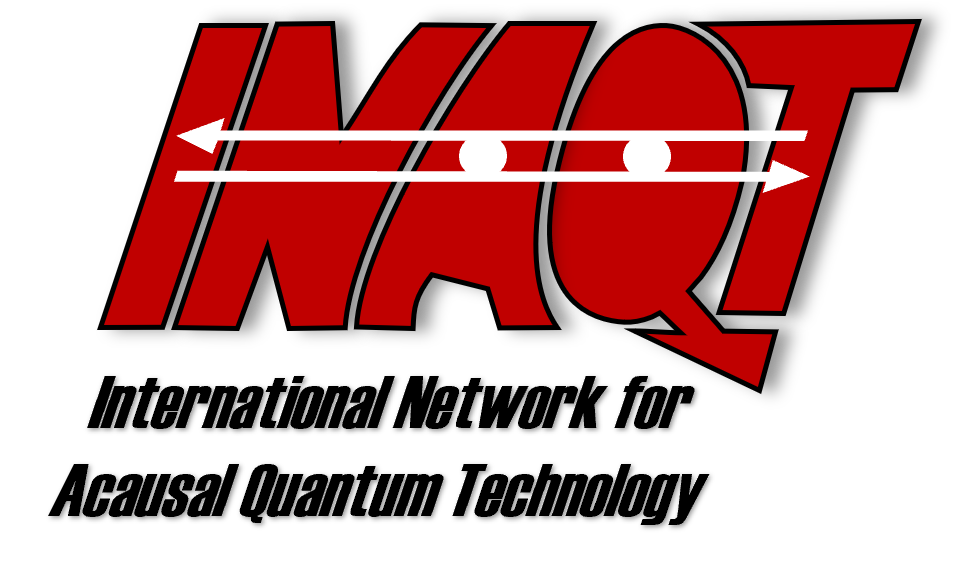INAQT Management Team
We are delighted to introduce our management team, who will oversee the smooth running of the network. Please feel free to get in touch us if you are interested in our network!

Sonja Franke-Arnold (chair)
Prof Sonja Franke-Arnold holds the Chair of Quantum Optics in the School of Physics and Astronomy at the University of Glasgow, since 2018 is an elected Fellow of the Institute of Physics. She has over 25 years’ of experience in atom and quantum optics and is internationally recognized for her work on the nature of light with phase and polarisation singularities and its interaction with atoms. Her team has developed this work towards applications in funded collaborations with optical and bio-medical companies. Relevant to INAQT, she has a track record in generating and analysing structured light which provides a convenient testing ground for ICO applications in metrology. Prof Franke-Arnold has experience in managing consortia and networks, and has been Glasgow PI and workpackage leader on two European grants. She was Chair of the international conferences ICOAM 2013, QuAMP 2017 and “Quantum Technologies with cold atoms” at Photonex 2019 and 2020.

Sarah Croke (co-chair)
Dr Sarah Croke is a Senior Lecturer in the School of Physics and Astronomy at the University of Glasgow. She is recognised for her work on quantum-limited measurements, and has over 16 years of experience working in quantum information, quantum optics and related areas. Relevant to the network, she has a track record of working with experimental teams, as well as theoretical expertise in time reversal symmetry, the structure of sequential quantum interactions, and in analysing pre-and post-selected scenarios using the time-symmetric formulation of quantum mechanics. Dr Croke has served on the organising or program committee for five international conferences, was co-chair (together with Prof Franke-Arnold) of the international conference QuAMP 2017, and is one of the organisers of the national QUISCO network of quantum information scientists in Scotland.

Carmel O'Brien
Carmel O'Brien is a Research and Teaching Support Administrator at the University of Glasgow. She joined the School of Physics and Astronomy in December 2022, and will be providing administrative support for the Network.

Peter Mosley
Dr Peter Mosley is a Senior Lecturer in the Department of Physics at the University of Bath and leads a research group in fibre-based quantum optics. He is a member of the Centre for Photonics and Photonic Materials and served as its director from 2015 - 2021. Mosley is known for developing high-quality sources of heralded single photons across a range of platforms, and his group currently works on engineering photon-pair sources in photonic crystal fibre enhanced with optical switch networks. Mosley is an active member of the UK Quantum Technology community as a co-investigator in the Quantum Computing and Simulation Hub within which his group is developing frequency-conversion interfaces to unify the operating wavelength of disparate network nodes. His broader research activities include hollow-core fibre for hosting light-matter interactions and topological modes in photonic crystal fibre.

Jacqui Romero
Jacq was born and bred in Manila, Philippines. Hearing her high school physics teacher complain about quantum physics, she became curious and googled "quantum physics"—she has been hooked ever since. She holds BS Applied Physics magna cum laude and MS Physics degrees from the University of the Philippines. She finished her PhD at the University of Glasgow (in sunny Scotland!) where she was a researcher for seven years. In 2015, she moved to Brisbane to join the Quantum Technology group at the University of Queensland. In 2016 she took up an ARC DECRA fellowship with the same group. In 2019, she took up a Westpac Research Fellowship and formed her own team, Qudits@UQ. Jacqui is recognised for her work on moving the shape of photons to mainstream quantum information. She has received several prestigious national and international awards which include: a L'Oreal-UNESCO For Women In Science award in 2017 (one of four in Australia), the Ruby Payne-Scott Medal of the Australian Institute of Physics for excellence in early-career research in 2018, and a L'Oreal-UNESCO For Women In Science International Rising Talent Award in 2019 (one of fifteen awards globally).
She is currently a reader and Westpac Research Fellow at the University of Queensland. She is also a chief investigator at the Centre of Excellence For Engineered Quantum Systems (EQUS).

Lee Rozema
Lee Rozema completed his PhD on Experimental Quantum Measurement at the University of Toronto under the supervision of Aephraim Steinberg in 2014. During his PhD, he worked on a range of experiments from probing Heisenberg's Uncertainty Principle to performing more precise measurements using entangled photons. Following his PhD, Lee held a two-year Postdoctoral Fellowship from the Natural Sciences and Engineering Research Council of Canada in the group of Philip Walther at the University of Vienna. He then went on to win a Templeton Independent Research Fellowship, which he held in same group. During these fellowships Lee kept a strong interest in foundational quantum mechanics, performing some of the first experimental demonstrations of an indefinite causal order. Since 2019, he has worked as a senior scientist at the University of Vienna. He is currently working projects to characterize novel optical nonlinearities, apply fiber-based technology to quantum information settings, and he is developing new experimental techniques to create and characterize indefinite causal orders.

Łukasz Rudnicki
Łukasz Rudnicki is a physicist working in the field of quantum information, with emphasis on quantum optics and open system dynamics. Łukasz received his PhD in 2012 at the University of Warsaw, while working in Center for Theoretical Physics PAS. Then he was a postdoc in Freiburg and Cologne, and a senior scientist in Max Planck Institute for the Science of Light in Erlangen. Currently, Łukasz is a group leader at International Centre for Theory of Quantum Technologies (ICTQT) and deputy director of National Quantum Information Centre, both located in Gdańsk. He is a coordinator of ApresSF consortium within QuantERA. Łukasz also represents Poland in Quantum Community Network, an advisory body of the Quantum Flagship.


